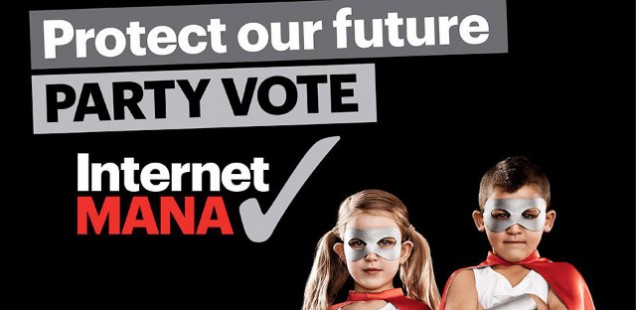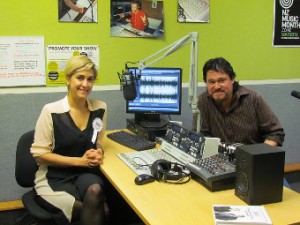New Zealand’s Election Results | PirateTimes

New Zealand’s Election Results
For many in New Zealand and overseas the Internet Party was the “stand-in” for the ailing Pirate Party of New Zealand. It shared many policies with the international Pirate Movement in the areas of human rights, whistle-blower protection, net politics, copyright reform, privacy, transparency, surveillance and others. Early in the campaign, with its alliance partner Mana, they were polling well at 3–4% and were expected to get several MPs in Parliament. In the end they only achieved slightly more than 1% and no representatives.
For an overview of the political environment in New Zealand take a look at the Political Compass.
What went wrong?
Dirty Politics
The elections were the most exciting for decades and beset with scandals and revelations. Kiwi investigative journalist Nicky Hager got hold of a load of emails and Facebook chat logs from an attack right-wing blogger. He exposed the corruption in his book, Dirty Politics. The revelations include that he was getting inside information directly from Justice Minister Judith Colins and members of the Prime Minister’s office. Colins resigned and some of Prime Minister John Key’s staff went into hiding. The blog is called Whaleoil (warning: the site uses canvas fingerprinting so you should have Ghostery or similar protection). Attack politics favours the right as it tends to put people from the left off voting, and that is one of the reasons the National Party chose to use it. The National Party also learned lessons from the US Republican Party and chose to keep the leader, John Key, “above the dirt” with a genial image while his opposition was mercilessly attacked from both outside and inside his own party. This is called “two track” attack politics and was used extensively during the last Bush Presidency. These attacks extended to civil servants (government workers) one of whom received death threats as a result. Further, companies from the alcohol, tobacco and carbonated drinks industries hired Whaleoil to attack researchers and health educators, especially those trying to fight New Zealand’s obesity epidemic. New Zealand’s media, including the supposedly impartial state-operated radio and television stations, is supportive of the governing National Party. They source their political reports from blogs, especially Whaleoil and Kiwiblog. This was predicted to be the deathblow for any chance of Mr Key retaining power.
Spying
The next unusual event was Kim Dotcom’s “Moment of Truth” in Auckland’s town hall (the largest city in New Zealand). Here Dotcom, Glenn Greenwald, Edward Snowden and Julian Assange revealed that New Zealanders were being subjected to mass surveillance through the NSA’s XKeyscore program. Additionally, an alleged email from Warner Brothers showed that Mr Key lied when he claimed not to know about Kim Dotcom before the raid on his mansion. Key dismissed the allegations and accused the foreigners of wanting to influence New Zealand’s elections. This was also claimed of Eminem whose company took legal action against the National Party for infringing copyright on his music in a political advertisement. This is particularly ironic when one considers that the same government bought in a three-strikes law for file-sharers.
Flawed electoral process
New Zealand’s electoral system is mixed-member proportional (MMP) with a provision called “coat-tailing.” A party that achieves at least one electorate candidate elected can bring in list party candidates, even though they are under the 5% threshold. The Internet Mana alliance was relying on Mana leader Hone Harawira retaining his seat to get other list candidates, including Internet Party leader Lala Harre, into Parliament. In a concerted action by left- and right-wing parties they managed to squeeze him out of his seat and thus end the alliance’s hopes. This same provision is used by the National Party to get allied parties into government: for example they ran no candidate against the far right-wing ACT Party, assuring them a seat. However, in this election their party vote was so low that no extra MPs could be coat-tailed in.
Paranoia
New Zealand is a remote country and is very parochial in nature: Kiwis do not like other people criticising them for whatever reason. This makes them vulnerable to willfully ignoring truth and prone to “shooting the messenger.” This is much like the victim of a school bully protecting his attacker from the interference of an authority figure. Key was able to smear them as Kim Dotcom’s foreign henchmen and besmirch their credibility with voters. In fact, this reaction led to the government increasing their vote and punishing all left-wing parties (and the Labour Party, which, as one can see from the Political Compass, is not a left-wing party). Nicky Hager received some flack from the politicians and the media, but nothing compared to the vitriol thrown at the four horsemen of #InternetFreedom. However, these topics are not off the table, and in the coming months and years New Zealanders are going to want answers from their leaders.
Inexperience
The Internet Party is only six months old. The Mana Movement has been around for longer but is small and concentrated on the indigenous Maori population and those on the lower end of the socioeconomic scale. There has not been enough time to build up a grassroots movement with the knowledge and experience to run a local campaign effectively. Only the leader of the Internet Party, Laila Harre, has any real political experience. That said I visited the Internet Mana candidate for Palmerston North, Dr Pani Farvid, and was impressed with her small but dedicated team who spent many hours campaigning in the city. I hope they realise that these groups are the richest resource the Party has right now and they must be kept active and working for the party in the three years to the next election.
What can we learn from the Internet Party and other parties in this election?
Celebrities
Celebrities are no guarantee of success. The most successful celebrities among Pirates are the ones who have come up through the ranks of the Party. Julia Reda, Marina Weissband, Amelia Andersdotter, Christian Engstrom, Rick Falkvinge and Birgitta Jónsdóttir, for example (Birgitta was well-known before she became a Pirate, but she received the attention for much the same reasons). We are probably better off without the bombastic politicians that thrive in a pachydermocracy, where only a few make it to positions of prominence.
Negative campaigning
The far right excel and profit from this form of campaigning. The left and the center are better off avoiding attack politics. Attack the policies, not the people. We should learn to recognise this pernicious form of politics and expose it where practicable, but never use it ourselves. Remember that when these tactics are exposed it hurts the left-wing turnout and this compromises democracy. Our supporters expect more of us and will not be forgiving, whereas the far right voters will applaud such tactics.
Cooperation
We do not have all the answers and should cooperate with other parties and organisations where we have mutual goals and policies, and refrain from attacking each other.
Loyalty
The Internet Mana Party was very disciplined even when mistakes were made. Party members backed each other. Loyalty to party colleagues and democratically decided policies is something Pirates need to learn urgently: there was none of the trolling and mobbing that has been the hallmark of some Pirate Parties of late.

About Andrew Reitemeyer
I joined the Pirate Party of Lower Saxony in Germany in April 2012, once I found out that non citizens were welcome to join and become active members of the Party.
I joined the Pirate Times soon after it was started as a proof reader and am now an editor and author. Since then I have returned to my native New Zealand and joined the Pirate Party of New Zealand.
Politically I come from the libertarian left and have, up to now, not regarded any political party as having a solution for the democratic deficit that envelops the world. With the advent of the Pirate Party, which truly embraces grass roots democracy, I have found a political home. The Pirate Times is a way I can contribute to furthering the Pirate Movement around the world.
Skype: frithogar
All content is CC-BY if not mentioned otherwise. Please link back to us if using content.


















Francisco George
Emil Kirkegaard
c3o
julian correa
Josef Ohlsson Collentine